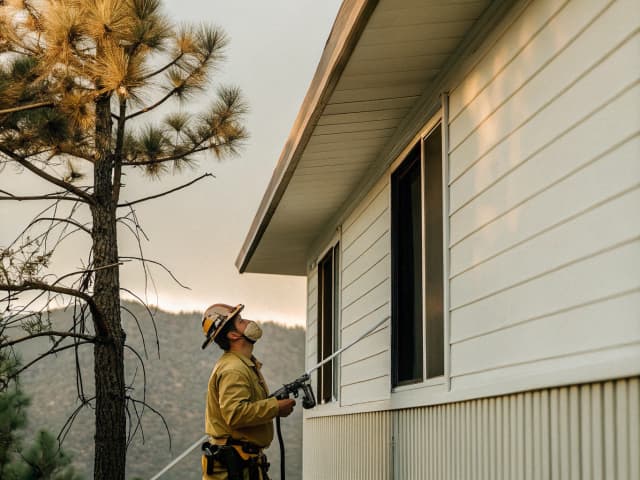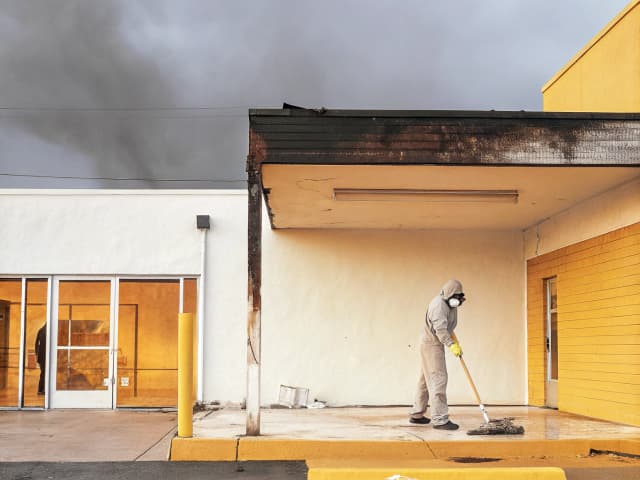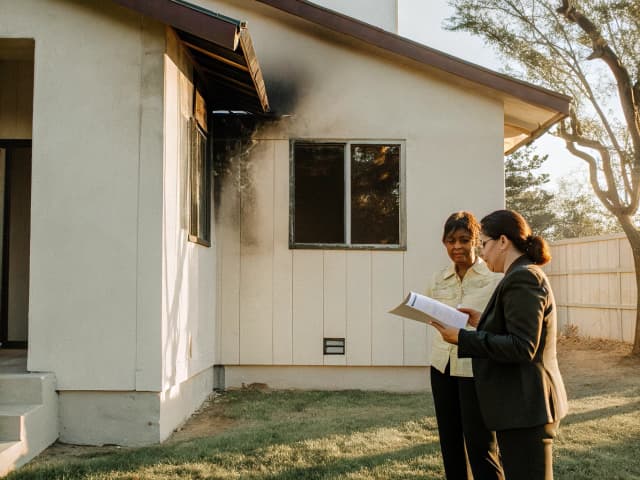Insurance Market & FAIR Plan Reform

Crimes.
Establishes visible ID rules for nonuniformed officers and broadens impersonation crimes. Requires agencies to post a visible ID policy by January 1, 2026 and takes effect immediately. Exempts undercover, plainclothes, protective roles, and PPE from ID display. Bans using bail fugitives for immigration enforcement and limits sharing fugitives’ personal info.
Crimes.

Establishes visible ID rules for nonuniformed officers and broadens impersonation crimes. Requires agencies to post a visible ID policy by January 1, 2026 and takes effect immediately. Exempts undercover, plainclothes, protective roles, and PPE from ID display. Bans using bail fugitives for immigration enforcement and limits sharing fugitives’ personal info.

Residential property insurance: tree fire risks.
Exempts homeowners from tree removal regulations when insurers and state fire officials identify trees as fire hazards. Requires both insurance companies and the Department of Forestry to confirm a tree poses a fire risk. Waives all state and local fees and fines associated with removing dangerous trees from residential properties.
Residential property insurance: tree fire risks.

Exempts homeowners from tree removal regulations when insurers and state fire officials identify trees as fire hazards. Requires both insurance companies and the Department of Forestry to confirm a tree poses a fire risk. Waives all state and local fees and fines associated with removing dangerous trees from residential properties.

Department of Insurance: housing insurance study.
Establishes a temporary study in the Insurance Code on affordable housing insurance. Requires insurers to provide data with trade-secret protections. Requires a report to lawmakers within one year of appropriation. Sunsets the chapter in 2031 and ties implementation to funding.
Department of Insurance: housing insurance study.

Establishes a temporary study in the Insurance Code on affordable housing insurance. Requires insurers to provide data with trade-secret protections. Requires a report to lawmakers within one year of appropriation. Sunsets the chapter in 2031 and ties implementation to funding.

Insurance: Climate and Sustainability Insurance and Risk Reduction Grant Program.
Establishes a state grant program to develop innovative climate-related insurance solutions through 2035. Requires testing of community-purchased insurance models to reduce costs in high-risk climate areas. Mandates progress reports to legislative insurance committees every three years starting January 2029. Prioritizes expanding insurance access for vulnerable communities most exposed to climate disasters.
Insurance: Climate and Sustainability Insurance and Risk Reduction Grant Program.

Establishes a state grant program to develop innovative climate-related insurance solutions through 2035. Requires testing of community-purchased insurance models to reduce costs in high-risk climate areas. Mandates progress reports to legislative insurance committees every three years starting January 2029. Prioritizes expanding insurance access for vulnerable communities most exposed to climate disasters.

Insurer financial statements.
Increases late filing penalties for insurance companies that fail to submit required financial statements on time. Sets an initial late fee of $800 for missed financial statement deadlines. Imposes an additional monthly penalty of $900 for continued non-compliance.
Insurer financial statements.

Increases late filing penalties for insurance companies that fail to submit required financial statements on time. Sets an initial late fee of $800 for missed financial statement deadlines. Imposes an additional monthly penalty of $900 for continued non-compliance.

Commercial property insurance cancellation and nonrenewal.
Imposes a one-year ban on canceling or renewing commercial property policies in fire-affected ZIPs. Requires CAL FIRE and OES to define the fire perimeter and issue a bulletin listing affected ZIP codes. Carves out exceptions for willful negligence, unrelated losses, or changes making the risk uninsurable. Overrides the premium threshold for HOAs, condos, student housing, and other housing.
Commercial property insurance cancellation and nonrenewal.

Imposes a one-year ban on canceling or renewing commercial property policies in fire-affected ZIPs. Requires CAL FIRE and OES to define the fire perimeter and issue a bulletin listing affected ZIP codes. Carves out exceptions for willful negligence, unrelated losses, or changes making the risk uninsurable. Overrides the premium threshold for HOAs, condos, student housing, and other housing.

California FAIR Plan: manufactured homes.
Adds manufactured homes and mobile homes to basic property insurance. Implements parity in terms and conditions with other dwellings. Maintains the earthquake coverage framework and renewal notices. Declares no new appropriation is required and maintains oversight with the Insurance Commissioner.
California FAIR Plan: manufactured homes.

Adds manufactured homes and mobile homes to basic property insurance. Implements parity in terms and conditions with other dwellings. Maintains the earthquake coverage framework and renewal notices. Declares no new appropriation is required and maintains oversight with the Insurance Commissioner.

Insurance.
Establishes the Insurance and Climate Risk Market Intelligence Act to collect reinsurance data and model use. Requires annual March 1 reports by insurers with $50M+ premiums on reinsurance data and catastrophe models. Protects confidentiality of submissions and posts aggregated public reports. Extends loss timelines and contents advances during emergencies, with 60% contents up to $350k and July 1, 2026 compliance.
Insurance.

Establishes the Insurance and Climate Risk Market Intelligence Act to collect reinsurance data and model use. Requires annual March 1 reports by insurers with $50M+ premiums on reinsurance data and catastrophe models. Protects confidentiality of submissions and posts aggregated public reports. Extends loss timelines and contents advances during emergencies, with 60% contents up to $350k and July 1, 2026 compliance.

Insurance agents: prelicensing education.
Shifts prelicensing from 20 hours to a 12-hour ethics/code requirement. Establishes a curriculum board to shape exams, CE curricula, and provider standards. Implements a fee-based framework for ethics course certification and CE providers. Creates cargo shipper limited license with no exam and vehicle service contract licensing.
Insurance agents: prelicensing education.

Shifts prelicensing from 20 hours to a 12-hour ethics/code requirement. Establishes a curriculum board to shape exams, CE curricula, and provider standards. Implements a fee-based framework for ethics course certification and CE providers. Creates cargo shipper limited license with no exam and vehicle service contract licensing.

California Safe Homes grant program.
Establishes the California Safe Homes grant program to reduce wildfire losses. Creates Sustainable Insurance Account within the Insurance Fund for program funding. Prioritizes roof replacement, 5-foot zones, and community mitigation by jurisdictions. Sets eligibility for high-risk ZIPs with admitted insurers or FAIR Plan; enables rulemaking.
California Safe Homes grant program.

Establishes the California Safe Homes grant program to reduce wildfire losses. Creates Sustainable Insurance Account within the Insurance Fund for program funding. Prioritizes roof replacement, 5-foot zones, and community mitigation by jurisdictions. Sets eligibility for high-risk ZIPs with admitted insurers or FAIR Plan; enables rulemaking.

Wildfire Safety and Risk Mitigation Program.
Establishes a wildfire model funding program and university grants, contingent on appropriation. Administers grants competitively with standards, metrics, and alignment to insurance laws and public info. Prioritizes disadvantaged communities, government protection, education, and public risk data. Operative upon appropriation; publishes plan and milestones online; preserves rate authority.
Wildfire Safety and Risk Mitigation Program.

Establishes a wildfire model funding program and university grants, contingent on appropriation. Administers grants competitively with standards, metrics, and alignment to insurance laws and public info. Prioritizes disadvantaged communities, government protection, education, and public risk data. Operative upon appropriation; publishes plan and milestones online; preserves rate authority.

Bonds: public entities as beneficiaries.
Establishes new requirements for bonds given to public entities in property-related contracts. Requires public entities to agree to make direct payments to contractors or their sureties. Mandates public entities to fulfill all contractual obligations before a bond becomes effective.
Bonds: public entities as beneficiaries.

Establishes new requirements for bonds given to public entities in property-related contracts. Requires public entities to agree to make direct payments to contractors or their sureties. Mandates public entities to fulfill all contractual obligations before a bond becomes effective.

State Emergency Food Bank Reserve Program: diapers and wipes.
Expands SEFBRP to include diapers and wipes. Authorizes use of SEFBRP funds to purchase, distribute, and reimburse diapers and wipes. Defines eligible food banks as EFAP/CSFP participants and CA Feeding America members. Grants procurement exemptions and allows informal implementation, pending appropriation.
State Emergency Food Bank Reserve Program: diapers and wipes.

Expands SEFBRP to include diapers and wipes. Authorizes use of SEFBRP funds to purchase, distribute, and reimburse diapers and wipes. Defines eligible food banks as EFAP/CSFP participants and CA Feeding America members. Grants procurement exemptions and allows informal implementation, pending appropriation.

California Pollution Control Financing Authority: name change.
Renames the pollution financing authority to Capital Programs and Climate Financing Authority. Establishes ADA, seismic, and CALReUSE loan funds with continuous appropriation. Expands rate reduction bonds with expedited review, fees, and annual reporting. Creates Employee Ownership Hub and expands organic waste rules with penalties and rural exemptions.
California Pollution Control Financing Authority: name change.

Renames the pollution financing authority to Capital Programs and Climate Financing Authority. Establishes ADA, seismic, and CALReUSE loan funds with continuous appropriation. Expands rate reduction bonds with expedited review, fees, and annual reporting. Creates Employee Ownership Hub and expands organic waste rules with penalties and rural exemptions.

Fire insurance: reporting on cancellation and nonrenewal.
Requires annual reporting on how wildfire-related insurance cancellation bans affect California homeowners. Prohibits insurers from canceling fire insurance policies in wildfire-affected areas for one year after emergencies. Mandates insurers to adjust coverage limits when homes are being rebuilt after total losses. Requires the state to track how many affected homeowners switch to last-resort FAIR Plan coverage.
Fire insurance: reporting on cancellation and nonrenewal.

Requires annual reporting on how wildfire-related insurance cancellation bans affect California homeowners. Prohibits insurers from canceling fire insurance policies in wildfire-affected areas for one year after emergencies. Mandates insurers to adjust coverage limits when homes are being rebuilt after total losses. Requires the state to track how many affected homeowners switch to last-resort FAIR Plan coverage.

False or misleading commercial disaster communication.
Increases penalties by up to $2,500 for deceptive insurance advertising during declared disasters. Applies enhanced penalties to commercial communications targeting disaster victims for up to 180 days. Targets for-profit companies that advertise disaster-related services using misleading government references. Protects disaster survivors from scams during the 60-day recovery period after emergencies end.
False or misleading commercial disaster communication.

Increases penalties by up to $2,500 for deceptive insurance advertising during declared disasters. Applies enhanced penalties to commercial communications targeting disaster victims for up to 180 days. Targets for-profit companies that advertise disaster-related services using misleading government references. Protects disaster survivors from scams during the 60-day recovery period after emergencies end.

Public insurance adjusters.
Strengthens regulations for public insurance adjusters by requiring detailed service descriptions and fee restrictions in contracts. Prohibits adjusters from soliciting clients during active disasters or between 6 PM and 8 AM. Extends contract cancellation period to 5 days for disaster victims and allows immediate cancellation for misrepresentation. Mandates clear fee disclosures and prevents charging fees on insurance payments made before contract signing.
Public insurance adjusters.

Strengthens regulations for public insurance adjusters by requiring detailed service descriptions and fee restrictions in contracts. Prohibits adjusters from soliciting clients during active disasters or between 6 PM and 8 AM. Extends contract cancellation period to 5 days for disaster victims and allows immediate cancellation for misrepresentation. Mandates clear fee disclosures and prevents charging fees on insurance payments made before contract signing.

Insurance Consumer Privacy Protection Act of 2025.
Establishes new privacy standards requiring insurance companies to protect and limit use of consumer data. Requires insurers to obtain consumer consent before sharing personal data for non-insurance purposes. Mandates clear privacy notices explaining how consumer data is collected, used and shared. Authorizes penalties up to $1 million for privacy violations and creates criminal penalties for data theft.
Insurance Consumer Privacy Protection Act of 2025.

Establishes new privacy standards requiring insurance companies to protect and limit use of consumer data. Requires insurers to obtain consumer consent before sharing personal data for non-insurance purposes. Mandates clear privacy notices explaining how consumer data is collected, used and shared. Authorizes penalties up to $1 million for privacy violations and creates criminal penalties for data theft.

Insurance: policy documents.
Reduces the time insurers must provide fire insurance policy copies after a loss from 30 to 15 days. Requires insurers to provide one free policy copy annually to customers who have not filed claims. Allows electronic delivery of policy documents during declared states of emergency.
Insurance: policy documents.

Reduces the time insurers must provide fire insurance policy copies after a loss from 30 to 15 days. Requires insurers to provide one free policy copy annually to customers who have not filed claims. Allows electronic delivery of policy documents during declared states of emergency.

Insurance: residential and commercial.
Requires California to cover residential property insurance rate increases above 7% through 2030. Eliminates state tax on residential property insurance premiums starting January 2026. Mandates a $1 billion annual investment in fire risk reduction over four years. Requires the Department of Insurance to propose regulatory reforms by March 2026.
Insurance: residential and commercial.

Requires California to cover residential property insurance rate increases above 7% through 2030. Eliminates state tax on residential property insurance premiums starting January 2026. Mandates a $1 billion annual investment in fire risk reduction over four years. Requires the Department of Insurance to propose regulatory reforms by March 2026.

Mortgages: hazard insurance proceeds.
Requires financial institutions to pay 2% annual interest on hazard insurance proceeds held for property repairs. Prohibits banks from charging fees that would reduce insurance proceeds interest below 2% annually. Takes effect immediately to protect wildfire victims rebuilding their homes. Allows banks to deposit insurance proceeds in interest-bearing accounts at federal institutions.
Mortgages: hazard insurance proceeds.

Requires financial institutions to pay 2% annual interest on hazard insurance proceeds held for property repairs. Prohibits banks from charging fees that would reduce insurance proceeds interest below 2% annually. Takes effect immediately to protect wildfire victims rebuilding their homes. Allows banks to deposit insurance proceeds in interest-bearing accounts at federal institutions.

Insurance: the California FAIR Plan Association.
Modernizes the California FAIR Plan by requiring both a website and toll-free number for insurance assistance. Removes the requirement to publish the FAIR Plan's toll-free number in telephone directories. Eliminates the mandate for the FAIR Plan to file new rate applications with the Insurance Commissioner.
Insurance: the California FAIR Plan Association.

Modernizes the California FAIR Plan by requiring both a website and toll-free number for insurance assistance. Removes the requirement to publish the FAIR Plan's toll-free number in telephone directories. Eliminates the mandate for the FAIR Plan to file new rate applications with the Insurance Commissioner.

Insurance.
Updates the licensing framework by replacing 'agent' with 'stock agent'. Deletes fingerprint submission requirements for certain license applicants. Expands automatic denial to bail, insurance adjuster, and public adjuster licenses. Extends State Compensation Insurance Fund investment authority indefinitely.
Insurance.

Updates the licensing framework by replacing 'agent' with 'stock agent'. Deletes fingerprint submission requirements for certain license applicants. Expands automatic denial to bail, insurance adjuster, and public adjuster licenses. Extends State Compensation Insurance Fund investment authority indefinitely.

California Pollution Control Financing Authority.
Expands the Capital Access Loan Program to accept new funding sources for small business assistance. Creates dedicated funds for ADA compliance and seismic retrofitting projects. Authorizes multiple forms of financial assistance including loans, grants, and credit enhancements. Limits administrative costs to 5 percent of appropriations to maximize program benefits.
California Pollution Control Financing Authority.

Expands the Capital Access Loan Program to accept new funding sources for small business assistance. Creates dedicated funds for ADA compliance and seismic retrofitting projects. Authorizes multiple forms of financial assistance including loans, grants, and credit enhancements. Limits administrative costs to 5 percent of appropriations to maximize program benefits.

California FAIR Plan Association governing committee.
California FAIR Plan Association governing committee.
